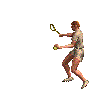|
 Custom Search
no tennis tip nothing about the right tennis grip, nor the proper forehand swing.There are just no specific tennis tips at all. It doesn't mention tennis at all but it is important for the budding or the advanced tennis player to grasp the importance of mental preparation or mental training for peak performance in tennis, whether the budding player aspires to be his best on Saturday morning matches or the advance player to raise his USTA ranking a notch. Mental Training
What mental tools do you have in your peak performer's tool kit that will propel you to excellence? Are you involved in any kind of mental training?Peak performers have a wide array of mental technologies to help them overcome obstacles, prepare for performances, and review and adjust their mental game. What follows is a list of some psychological tools you can use to create your own custom mental training system. Scan the list, try some skills that intrigue you, and then develop your own comprehensive peak performer's tool kit. 1. Visualization skills: using your mental movies to imagine yourself at peak. 2. Positive self-talk skills: keeping yourself motivated and on a positive track. 3. Breathing techniques: staying relaxed and in the present, staying calm under fire.
4.Goal setting: staying focused, energized and on track. 5. Mental game journal: noting your dreams, observations about your performances. 6. Audio tapes: using off-the-shelf music/voice or customize your own for inspiration. 7. Affirmations: talking nice to yourself, inspiring and empowering yourself. 8. Video tape your performance: seeing yourself perform is golden. 9. Relaxation techniques: staying under control under stressful conditions. 10. Pre-performance rituals: having a comforting system for handling details.
11.Posture awareness: controlling your perceived image and your bodily energy. 12. Post-performance review: analyzing how you did and how to do better. 13. Anger management skills: handling frustration with goal-setting and centering. 14. Centering skills: staying grounded, focused, relaxed and tuned in, all at once. 15. Mistake management skills: dealing with inevitable errors by cognitive techniques.
16. Momentum skills: using a performance's ambiance to gain control. 17. Psych-out/heckler management skills: dealing with rude audience members. 18. Coach communication skills: having clear, open dialogue with your coaching team. 19.Contingency plans: having back-up strategies, in addition to a main plan. 20. Percentage thinking: thinking the way experienced performers see their discipline.
21.Pre-performance warm-up: having a system for being ready mentally and physically like mental training. 22. Practice performances: practicing gives confidence and makes skills automatic. 23. Time management skills: using your precious time to become more efficient. 24. Distributed practice: breaking up your practices instead of having one big session. 25. Concentration skills: learning how to focus, inward/outward and broad/narrow.

26. Awareness in-the-moment: being aware of yourself in the here and now. 27. Thought-stopping: saying STOP! to unwanted thoughts when they occur.28. Pacing skills: controlling your energy and bodily movement. 29. Having a game plan: making a main and backup strategy for your performance. 30. Performance-charting: having someone analyze your performance real-time.
31. Interventions: any skill, technique or approach you use to improve performance. 32. Shaping: making progressively closer attempts to your ideal performance target. 33. Process vs. product focus: letting outcome take care of itself by focusing on process. 34.Reinforcement: giving yourself praise, rewards and strokes when you succeed. 35. Meditation: relaxing and focusing your mind so you have control anytime.
36. Modeling: observing ideal behaviors in others and making them your own. 37. Music: using the power of music to soothe, psyche-up and motivate yourself. 38. Self-hypnosis: using trance to program yourself for anything you desire. 39. The third eye: having an objective, observing part of the self to self-coach. 40. Role-playing: practicing as an actor how you want to perform in actuality.
41.Sense of humor: gaining perspective on a pressure situation by finding mirth in it. 42. Creativity tools:using your mind to see new possibilities, new perspectives. 43. Mentoring: having a mature, successful guide who has been where you want to go and can provide you with essential mental training. 44.Daydreaming: using mind wandering as constructive, creative, synergistic time. 45. Assertiveness skills: seeking your rights without being aggressive or passive.
46.Reframing: seeing a situation in a different way, from another perspective. 47. Action-orientation: overcoming inertia to initiate and sustain a project. 48. Risk-taking skills: taking appropriate chances after careful consideration. 49. Perspective skills:keeping all things in strategic and tactical view at all times. 50. Balancing skills: maintaining center in one's life, under all conditions.
Copyright © Bill Cole, MS., MA. 2003. www.mentalgamecoach.com  Custom Search
Ability To Compete
|
